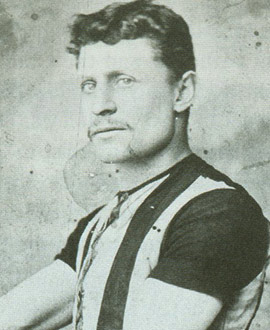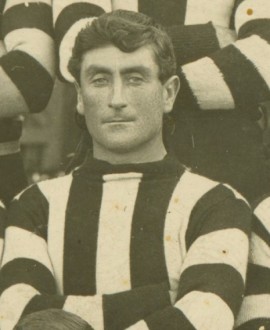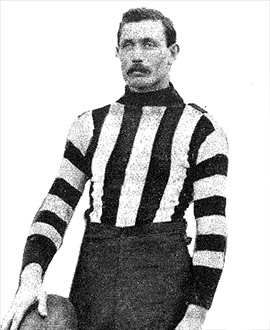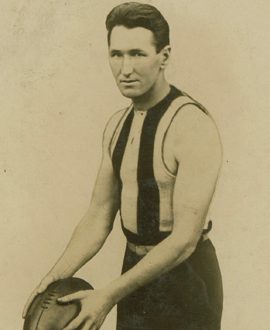Tom Baxter was a brilliant, fast and talented rover. But it’s easy to forget that, simply because his career was so heavily punctuated with controversy. He sits alongside names like Carman, Condon, McInerny and Langford as among the most scandal-dogged in the club’s history.
Drama seemed to follow Tom wherever he went. That started long before he came to Collingwood, again as he left, and once more when he sought a surprise return a decade later. He was suspected of taking a bribe, suspended for inciting crowds to violence and rubbed out for lengthy terms on at least three occasions – including one that was meant to be for life!
Thomas Michael Baxter came from Maldon and quickly became a legend in and around Bendigo football. He had already started to make a name for himself in local football circles when in 1905, aged 21, he was hailed for his heroism when he helped drag two of his brothers and another man to safety from fumes in the Mount Tarrangower mine.
But positive news stories would be harder to find in the years to come. Just three years later he was making local headlines for different reasons, after furious Long Gully supporters accused him of playing ‘dead’ in that team’s Grand Final loss to Eaglehawk. He’d been brilliant for Long Gully that year, but played what was described as a “lifeless” game on Grand Final day. Angry fans confronted him on the ground after the game, and the anger was such that he needed a police escort to get away from the ground.
The League tribunal subsequently charged him and two others with ‘playing stiff’ in the game and, following some damning testimony from his teammates, he was suspended for life. Upon hearing the news, Tom merely smiled and said, "Right-o. That will do.” He then left the room.
The suspension would later be overturned on appeal to the VFL, but a reputation had been established. And it proved very hard to shake.
One of the strangest things of all is that, at the time of this controversy, Tom was already a Collingwood player. In those days players in the Bendigo league would often play with VFL clubs at weekends and with their local clubs mid-week. The Magpies had noted his increasingly impressive performances in the country, and gave him his start in 1907. He quickly established a reputation as a skilful, quick and feisty rover. As Punch said after one of his early games: “Baxter, a new man forward, found the key to the Golden Gates, and promises to be a batch of twinkling stars in himself in the sweet bye and bye.”
“Baxter, from Maldon, their only other newcomer, was full of pluck, dash, and persistency, and acquitted himself admirably,” wrote The Age after his debut. “Baxter, of Maldon, is quite fit for their team. He has dash, determination, and that best of football qualities—the capacity to play on after a check,” said The Argus.
After all the dramas of 1908, you’d think Tom might have kept his head down in 1909. Instead he quit Collingwood, sending a letter to Ern Copeland explaining that he was working in the mines as a cyanide expert and that Saturday was his busiest day. He explained to Mr. Copeland that as his expenses to and from Melbourne were so heavy, it would be a financial relief to the club to lose him. The Magpies initially cleared him back to Maldon, but he ended up playing almost the entire season anyway – and placed highly in the Argus ‘Footballer of the Year’ competition.
By 1910 he was regarded as one of the premier rovers in the VFL, playing all 21 games, kicking 15 goals and winning wide praise for his all-round game. He played a major role in helping the club to the flag – but once again drama struck on Grand Final day, when Tom was involved in a fist fight with Carlton’s Jack Baquie during one of the wildest finals ever seen. He was subsequently rubbed out for a year – though once again he was reprieved, when teammate Richard Daykin wrote to the Tribunal claiming it had been him, not Baxter, in the brawl. Nobody believed him and it seemed the longest of long shots (Daykin was retiring so had nothing to lose), but the Tribunal bought the story and Baxter was free to play in 1911.
He enjoyed another fine season, topping the club’s goalkicking. But again, Grand Final day would prove Tom’s weak spot. In that year’s Grand Final against Essendon, Baxter had a shocker of a last quarter. With the game tense and close, he twice kicked into the man on the mark. He then missed several easy shots on goal. He did manage to steer one through, but it wasn’t enough and the Pies went down by a goal. The sub-headline for the match report in the Argus on Monday was, ‘Baxter’s Mistakes’.
In the wake of the narrow defeat, Baxter was accused of having played dead in the game. He was so incensed by the rumours that he asked the Collingwood committee to investigate. They did, and cleared him, but the rumours persisted. They grew even louder when he was cleared to St Kilda the next year, though Baxter always maintained that was his decision after learning of an alleged secret meeting of players to decide if they wanted to play with him, and feeling that many fans had become ‘hostile’ towards him. The end result was a widely held and oft-repeated view that Tom Baxter had taken a bribe in the 1911 Grand Final. It was something he never lived down.
Tom’s time at St Kilda was brief, and surprisingly uneventful. After one year there he returned to Maldon, and was soon back to his old tricks when in 1914 he threatened to take his team from the field in a fiery game against Daylesford in protest at the umpiring. In another game he threw the ball at an umpire. He was playing coach at Castlemaine in 1915, and led them to their first flag, but spent most of the rest of his football days back home with his beloved Maldon (where it is said he played into his 50s).
But there was a wonderful footnote to this extraordinary and controversial career. Midway through 1921, and almost 10 years after he’d left Collingwood, came a story that he’d been cleared from Maldon back to Victoria Park – at the age of 37. The Magpies later denied that he was going to be given a chance ahead of the team’s youngsters, but the transfer certainly happened.
It’s not known why he never played again after that transfer, but perhaps it was just as well. Later that year, in the local semi-final, Baxter’s Maldon team were being well beaten by Castlemaine when he yelled to his team’s fans: “You are mad if you let them finish the match – why don't you rush the ground?" A number of spectators immediately jumped the fence, and the police had difficulty in forcing them back. Baxter was subsequently charged with inciting a riot. His defence was that he was calling to the committee of the Maldon club to call the team off the ground in protest at the umpiring, but the Bendigo League’s investigation committee was having none of it, and suspended him for all of 1922.
That was classic Tom Baxter. A brilliant footballer, but he loved a stoush and never shied away from fights with umpires, or officialdom, or opponents, or sometimes even teammates. It’s just the way he was built. And while it makes a good story, it also means we never quite got to see the best of a player who had more talent than most.
- Michael Roberts





